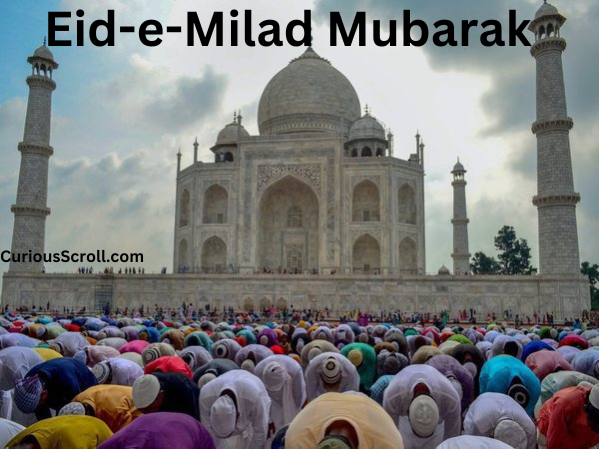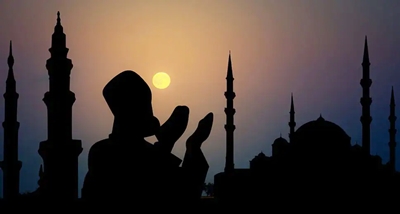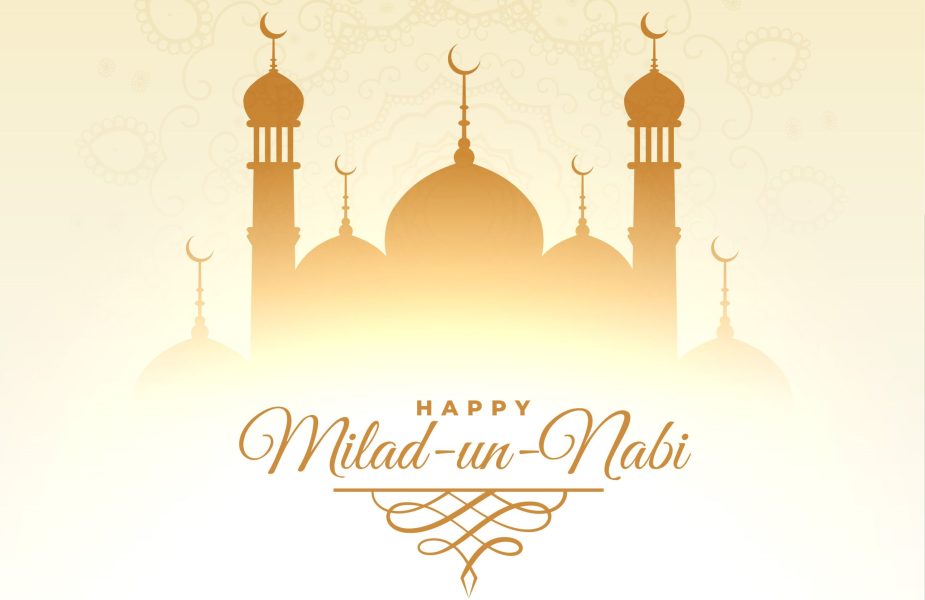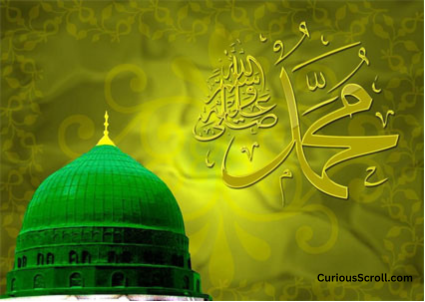Although the exact date for Eid-e-Milad un Nabi in 2023 has not yet been determined, it is anticipated to fall on September 28 (evening of Wednesday, September 27, 2023 – Thursday, September 28, 2023). The Islamic holiday Eid-e-Milad-un-Nabi commemorates the birth of Prophet Muhammad, who is said to have taken place on the 12th of Rabi al-Awwal, the third month of the Islamic calendar, in 573 AD.
The festival is celebrated by Muslims worldwide, and it is one of the most important festivals for the Shia and Sunni communities. The Shia community believes that on this day, the Prophet had chosen Hazrat Ali as his successor, while the Sunni community organizes prayer meetings throughout the day. Large processions and home decoration are common during Eid-e-Milad-un-Nabi celebrations. It is thought that Allah’s angel Jibril provided the Prophet with the Quran’s message.
Introduction to Eid-e-Milad (Mawlid al-Nabi)
Muslims throughout the world have a particular place in their hearts on Mawlid al-Nabi, also known as Eid-e-Milad. In honour of the Prophet Muhammad’s life and teachings, this is a time for joyful celebration, introspection, and social gatherings. Mawlid al-Nabi translates to signify the birth of the prophet since the Arabic word “Mawlid” denotes birth or nativity and “Nabi” indicates prophet.
Historical Background
Examining Eid-e-Milad’s historical antecedents is crucial to comprehending its significance:
- The Birth of Prophet Muhammad: Eid-e-Milad celebrates the Prophet Muhammad’s birth in the city of Mecca in 570 CE. Islam views him as the last prophet and regards him as the “Seal of the Prophets.”
- Origins of Celebrating Mawlid: Since the early years of Islam, people have been commemorating the Prophet’s birthday. Over time, it became more prevalent in many Islamic cultures and areas, giving rise to a variety of practises and traditions.
Significance of Eid-e-Milad 2023
Eid-e-Milad holds immense significance in Islamic tradition and for Muslims globally. This is how its significance might be summed up:
- Spiritual Remembrance: Muslims might take this chance during Eid-e-Milad to consider the life and teachings of the Prophet Muhammad. It’s a time to strengthen their connection with Allah and strive to emulate the Prophet’s character and values.
- Unity and Community: Muslims feel more unified and connected when they celebrate Mawlid. It unites individuals from different origins in a spirit of love and fervent dedication to their religion.
- Educational Value: Eid-e-Milad is a popular opportunity for academics to spread knowledge about the Prophet’s life, character, and teachings. This helps in spreading awareness and understanding of Islam.

Customs and Traditions
Eid-e-Milad is marked by various customs and traditions, which may vary across different cultures and regions. Here are some typical traditions linked to the holiday:
- Recitation of the Quran: Muslims often recite passages from the Quran, particularly those that discuss the life and mission of the Prophet Muhammad.
- Nasheeds and Qawwalis: Nasheeds and qawwalis, or devotional songs, are sung to extol the Prophet’s merits and character. These songs are sung enthusiastically and constitute an essential component of the celebration.
- Decorations: A festive ambiance is created by decorating houses, mosques, and streets with bright lights, banners, and flags. To represent the light of the Prophet’s instruction, several locations are lit up.
- Charity: Giving and charitable deeds are encouraged on Eid-ul-Milad. Muslims should assist the less fortunate by giving them food, clothing, and other necessities.
- Processions: In other areas, large processions are planned, in which people carry banners, images of the Prophet, and recite praises. A major mosque or shrine is frequently the destination of these processions.
- Lectures and Seminars: Lectures and seminars about the life and teachings of the Prophet Muhammad are frequently given by academics and religious authorities. For the community, these occurrences offer priceless insights and direction.
- Visiting Shrines: During this period, some Muslims make pilgrimages to the graves of important Islamic personalities or the mausoleum of the Prophet Muhammad in Medina to offer prayers and seek blessings.

Controversies and Differing Views
Even though Eid-e-Milad is commonly observed by Muslims, it’s crucial to note that there are several schools of thought among Muslims regarding how to observe this holiday. Some intellectuals and religious leaders endorse the festival, highlighting its importance in fostering Muslim unity and affection for the Prophet. Others, however, contend that it should not be done since it is against the customs of the early Islamic society and should be avoided.
The issue surrounding Eid-e-Milad has prompted a variety of approaches in various Islamic communities and sects. Some celebrate it as a grand event, while others may mark it with more modest gatherings or choose not to observe it at all. This multiplicity of viewpoints is a reflection of the larger diversity within Islam as well as the many approaches to the traditions of Islam.
Eid-e-Milad Around the World
Worldwide celebrations of Eid-e-Milad showcase the vast cultural and regional variety of the Muslim world. Here are some examples of how the holiday is observed in different countries:
- India and Pakistan: In South Asia, Eid-e-Milad is celebrated with great enthusiasm. Beautiful decorations are placed in the marketplaces and streets, and processions with elaborate floats and decorations are frequently organised. Devotional songs and recitations are a central part of the celebrations.
- Egypt: The festival is observed in Egypt by gatherings at mosques and shrines, when clerics give discourses about the Prophet’s life. Also chanted are hymns and devotional poems.
- Indonesia: Eid-e-Milad is observed in Indonesia by holding public prayers, giving lectures, and holding debates on the Prophet’s life. During this period, people also perform charitable deeds.
- Saudi Arabia: In Saudi Arabia, the nation where Islam was founded, Eid-e-Milad is not widely observed. Some persons and groups continue to commemorate it with private meetings and prayers even though it is not often recognised as an official holiday.
- Turkey: In Turkey, the holiday is known as Mevlid Kandili. It is observed with special prayers at mosques and homes, along with the lighting of candles and oil lamps to symbolize the Prophet’s guidance.
- Iran: A religious ceremony and gatherings at mosques and shrines are held throughout Iran to commemorate the festival. Those who follow him recite poems and perform deeds of kindness.
- Nigeria: Community prayers, lectures, and cultural activities all take place in Nigeria to celebrate Eid-e-Milad. It is an opportunity for Muslims to renew their religious commitment and honour the Prophet’s legacy.
- United States and Europe: In addition to lectures, exhibitions, and community dinners, Muslim communities in Western nations also celebrate Eid-e-Milad with a variety of events. The sense of belonging among Muslims who live in minority communities is bolstered by these events.

Contemporary Challenges and Adaptations
The celebration of Eid-e-Milad has had to change and adapt recently owing to a number of factors:
- Modern Technology: Muslims from all over the globe may now interact and share their festivities because to the increased use of technology, particularly social media, making it a worldwide event in the age of the internet.
- COVID-19 Pandemic: Like other religious celebrations, Eid-e-Milad was affected by the COVID-19 pandemic. To stop the virus from spreading, many customary festivities and processions were curtailed or abandoned, which increased the number of online lectures and celebratory events.
- Interfaith Engagement: By allowing non-Muslims to learn about the Prophet Muhammad and Islam, some communities use Eid-e-Milad as a time for interfaith conversation and involvement.
- Cultural Adaptations: The Eid-e-Milad celebration has combined with regional cultural traditions in various areas, resulting in one-of-a-kind events.
Conclusion
Eid-e-Milad, also known as Mawlid al-Nabi, is a major and celebrated holiday for Muslims all around the world. It provides an opportunity to reflect on the life and teachings of the Prophet Muhammad, fostering unity, love, and devotion among the Muslim community. The celebration continues to change and adapt in response to the possibilities and difficulties of the modern world, despite the diversity of opinions and practises surrounding its commemoration. Eid-e-Milad ultimately acts as a reminder of the Prophet’s status as a leader for Muslims and an inspiration for people of all religions.

Hi i think that i saw you visited my web site thus i came to Return the favore Im attempting to find things to enhance my siteI suppose its ok to use a few of your ideas
I was recommended this website by my cousin I am not sure whether this post is written by him as nobody else know such detailed about my difficulty You are wonderful Thanks
I needs to spend some time learning much more or understanding more.